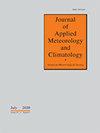台湾中部西海岸近海风速振荡案例研究
IF 2.2
3区 地球科学
Q3 METEOROLOGY & ATMOSPHERIC SCIENCES
引用次数: 0
摘要
本文利用观测和数值模拟数据,研究了 2018 年 2 月 17 日下午发生在台湾中部海岸线附近的一次风速振荡事件。在 100 米高空观测到的风速呈现出约 6 个周期的快速振荡模式,强风风速约为 21 米/秒,弱风风速约为 2 米/秒,周期约为 10 分钟。气压异常与风速异常反相波动。同步分析显示,受大陆高压系统影响,台湾上空爆发了冷空气。北北东冷风遇到台湾地形后分成两股,在台湾东海岸形成山脊,在台湾西海岸形成低槽。在台湾西海岸近海的低层冷空气中发现了风的振荡,表现为风速、海平面气压和潜在温度的波状结构。这些扰动被确定为开尔文-赫尔姆霍兹波浪,其特点是风速强、空气温暖干燥、下沉运动和低压区域相互连接,而风速较弱、空气凉爽湿润、上升运动和高压区域相互连接。在地形有利的条件下,低层冷空气南下加速和低槽北移产生的巨大垂直和水平风切变在引发风振荡方面发挥了重要作用。本文章由计算机程序翻译,如有差异,请以英文原文为准。
A Case Study on Wind Speed Oscillations Offshore the West Coast of Central Taiwan
This paper investigates a wind speed oscillation event that occurred near the coastline of central Taiwan in the afternoon of 17 February 2018, using data from observations and numerical simulations. The observed wind speeds at 100-m altitude displayed a fast-oscillating pattern of about 6 cycles between strong winds of approximately 21 m s−1 and weak winds of around 2 m s−1, with periods of about 10 min. The pressure anomalies fluctuated in antiphase with the wind speed anomalies. The synoptic analysis revealed the influence of a continental high-pressure system, resulting in a cold air outbreak over Taiwan. The cold north-northeasterly winds split into two branches upon encountering Taiwan's topography, with ridging off the east coast and a lee trough off the west coast of Taiwan. Wind oscillations were detected in the low-level cold air offshore the west coast of Taiwan, depicted by wave-like structures in wind speeds, sea-level pressure, and potential temperature. The perturbations were identified as Kelvin-Helmholtz billows characterized by regions of strong wind speeds, warm and dry air, sinking motions, and low pressure collocated with each other, while regions of weaker wind speeds, cooler and moister air, ascending motions, and high pressure were associated with each other. With terrain contributing to favorable conditions, the large vertical and horizontal wind shears resulted from the southward acceleration of low-level cold air and the northward movement of the lee trough played an important role in initiating the wind oscillations.
求助全文
通过发布文献求助,成功后即可免费获取论文全文。
去求助
来源期刊
CiteScore
5.10
自引率
6.70%
发文量
97
审稿时长
3 months
期刊介绍:
The Journal of Applied Meteorology and Climatology (JAMC) (ISSN: 1558-8424; eISSN: 1558-8432) publishes applied research on meteorology and climatology. Examples of meteorological research include topics such as weather modification, satellite meteorology, radar meteorology, boundary layer processes, physical meteorology, air pollution meteorology (including dispersion and chemical processes), agricultural and forest meteorology, mountain meteorology, and applied meteorological numerical models. Examples of climatological research include the use of climate information in impact assessments, dynamical and statistical downscaling, seasonal climate forecast applications and verification, climate risk and vulnerability, development of climate monitoring tools, and urban and local climates.

 求助内容:
求助内容: 应助结果提醒方式:
应助结果提醒方式:


